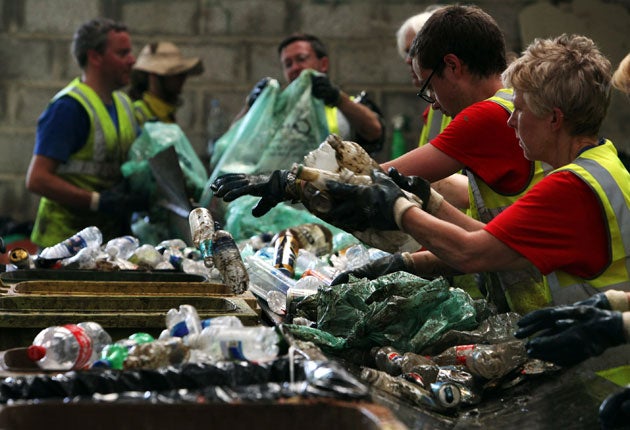Bins that reward recyclers may help clean up the streets
Government review wants household habits to continue when people step outside

Your support helps us to tell the story
From reproductive rights to climate change to Big Tech, The Independent is on the ground when the story is developing. Whether it's investigating the financials of Elon Musk's pro-Trump PAC or producing our latest documentary, 'The A Word', which shines a light on the American women fighting for reproductive rights, we know how important it is to parse out the facts from the messaging.
At such a critical moment in US history, we need reporters on the ground. Your donation allows us to keep sending journalists to speak to both sides of the story.
The Independent is trusted by Americans across the entire political spectrum. And unlike many other quality news outlets, we choose not to lock Americans out of our reporting and analysis with paywalls. We believe quality journalism should be available to everyone, paid for by those who can afford it.
Your support makes all the difference.Too many people are abandoning their green credentials when they step outside their front door, ministers will warn this week as they unveil a blueprint to encourage more recycling on the go.
Progress has been made in encouraging domestic recycling, but while diligently separating glass, plastics and tins at home, people on the move are dumping a mountain on the street, officials believe.
Recycling machines which recompense shoppers for disposing of litter could be installed in high streets across the country as part of the Government's waste review, to be published on Tuesday.
Caroline Spelman, the Environment Secretary, will admit that litter "remains at persistently high levels" and that recycling in stations, shopping malls and stadiums is "nowhere near as easy" as in the home. About 40 per cent of household rubbish is recycled today, up from 11 per cent in 2000/01.
The review will warn that a lack of outdoor recycling schemes could undermine the coalition's ambition for a "zero waste" economy where nothing is sent to landfill.
Ideas being studied include "reverse-vending machines", where a can or plastic bottle is placed in a chute and money is returned to the user. They are popular in Norway and the US and are now being piloted in a dozen Tesco stores, offering ClubCard points or donations to charities for each item recycled. Some town halls have begun installing separate street bins for paper, plastic and metal but risk angering opponents of street clutter.
"We have made good progress in recent years, but there's definitely more we can do to make sure we're recycling and reusing as much as possible. If we do that, it's better for both the environment and the economy, and it should be a priority," a government source said.
Officials at the Department for Environment, Food and Rural Affairs are also looking at ways to make music festivals and sporting events greener, by encouraging organisers to use cups and packaging that is easily recyclable. "If people cannot recycle when out and about, it breaks the link in the behaviours they practise at home, and undermines our wider ambition to make full use of the resources we produce," the review will say.
Newspapers and drinks and food packaging will carry messages encouraging people to recycle, and it will be made easier for Scout groups and school litter clubs to hand over rubbish they pick up. Manufacturers will also be told to cut packaging on toys, mobile phones and household goods.
Mrs Spelman will hope the focus on recycling deflects attention from a growing row over weekly bin collections. Senior ministers, including Eric Pickles, the Communities Secretary, have repeatedly pledged to abolish fortnightly collections after complaints that they lead to overflowing bins and encourage rats. The waste review will make clear that a return to weekly collections – which would cost £130m – is not on the cards. One government source said Mr Pickles was still "battling" with Defra and, contrary to reports, had not given up on the pledge.
In the meantime, ministers will "turn their fire on fly-tippers and 'neighbours from hell' who allow rubbish to pile up outside their house". The review will recommend the end of bin fines – which can be up to £110 – for people who put rubbish in the wrong box or overfill wheelie bins. Changes to the law will mean fines can be issued only if a new legal test of "harm to local amenity" is met.
The Government will emphasise that "rewards and recognition" through vouchers or discounts are a better way to encourage recycling than "enforcement and penalties".
Ministers will rule out imposing recycling targets on English councils, despite the UK's agreement to an EU target to recycle 50 per cent of all waste by 2020. Northern Ireland, meanwhile, has a goal of 60 per cent by 2020; and Scotland and Wales are both aiming for 70 per cent by 2025.
Join our commenting forum
Join thought-provoking conversations, follow other Independent readers and see their replies
Comments